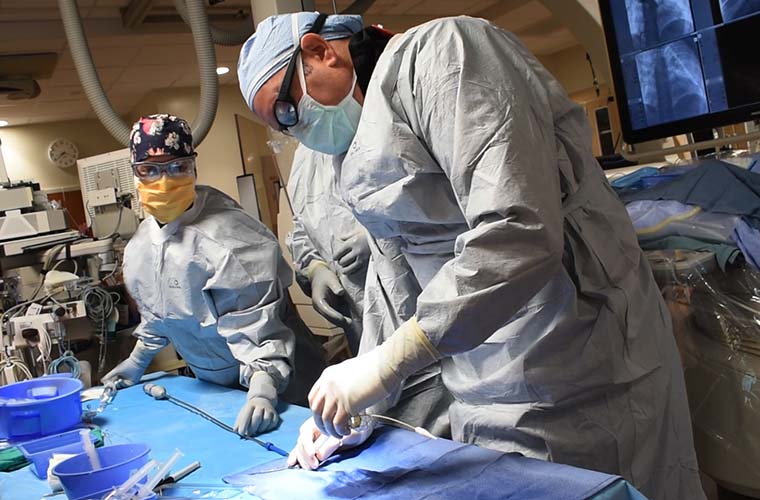St. Joseph’s Children’s Hospital First in Florida to Use Breakthrough Device for Non-Surgical Pulmonary Valve Replacement

Jasmine Harvey, 21, was born with the complex congenital heart condition tetralogy of Fallot and underwent open-heart surgery at St. Joseph’s Children’s Hospital when she was just 4-months-old. This procedure included the closure of a large hole between the bottom chambers of her heart and the widening of her narrowed pulmonary valve. As a teenager, the leakage of her pulmonary valve began to worsen which led to the enlargement of her right ventricle.
“I’ve known for years that my pulmonary valve would one day need to be replaced and dreaded the thought of having surgery again,” said Jasmine. “When the time finally arrived, I was so happy to discover that it could be done with a new, innovative option instead of open-heart surgery.”
On Dec. 8, 2021, Jasmine became one of the first patients in Florida to receive the Harmony™ Transcatheter Pulmonary Valve. The valve is placed via cardiac catheterization and provides an alternative to open-heart surgery for patients with leaky pulmonary valves. St. Joseph’s Children’s Hospital is the first facility in Florida and among a select few hospitals in the country to offer this revolutionary technology.
Congenital heart defects (CHD) are the most common type of birth defects, affecting an estimated 40,000 infants in the United States each year. Tetralogy of Fallot is one of the most common CHDs and all patients born with this diagnosis require initial heart surgery during infancy and usually additional cardiac procedures later in childhood or during adulthood.
“Open-heart surgical pulmonary valve replacement has been the standard treatment option for patients like Jasmine for decades,” said Dr. Jeremy Ringewald, pediatric cardiologist and the director of the Cardiac Catheterization Laboratory at St. Joseph's Children's Hospital in Tampa.
He adds that while the ability to replace pulmonary valves in the catheterization laboratory has been an option for many years, previously available transcatheter valve systems only allowed us to treat a small subset of patients.
“The Harmony is a game changer and allows us to expand minimally invasive options for far more patients with pulmonary valve disease,” Dr. Ringewald said. “Thousands of patients needing pulmonary valve replacement will be able to avoid open-heart surgery now.”
During Jasmine’s procedure, Dr. Ringewald inserted the Harmony valve loaded on its delivery catheter into a vein in her leg and guided the catheter by fluoroscopy to the location of her leaky pulmonary valve. The Harmony valve was deployed and once released, the valve immediately began functioning.
The Harmony has an hourglass-shaped nickel-titanium wire frame with a porcine (pig) heart tissue valve sewn inside it. The unique, self-expanding design allows the device to work for a wide variety of patients.
“As a regional leader in cardiovascular care, we are committed to continuously broadening our treatment options for our congenital heart patients,” said Dr. Ringewald. “We’re excited about the quality-of-life improvements this revolutionary device will provide for our patients.”
Jasmine’s procedure was a success and instead of spending approximately a week in the hospital typical of most open-heart surgical procedures, she was discharged after just one day.
“I’m so grateful to the entire congenital cardiac team at St. Joseph’s Children’s Hospital for fixing my heart not once, but twice now,” Jasmine added.
St. Joseph’s Children’s Hospital is home to the Tampa Bay area’s only comprehensive congenital heart disease program, and its pediatric heart physicians perform hundreds of procedures each year to treat congenital and acquired heart conditions in children of any age, including newborns. A partnership between St. Joseph’s Children’s Hospital and UPMC Children’s Hospital of Pittsburgh provides families across Florida with unprecedented access to the highest level of pediatric heart care available. Together, they provide highly specialized cardiovascular care for patients ranging from babies in the womb to adults with congenital heart disease.
